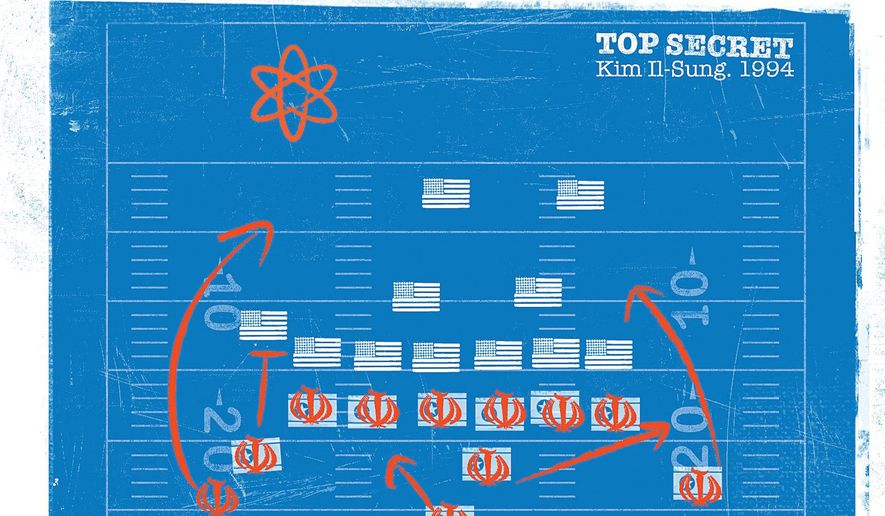OPINION:
We’ve seen this before. President Obama’s Iran nuclear deal looks increasingly like the disastrous deal the United States struck with the regime in North Korea. In 1994, the U.S. government signed a nuclear deal with North Korea that, according to then-President Clinton, would “make the United States, the Korean Peninsula and the world safer.” The agreement, we were told, did “not rely on trust,” but instead would involve a verification program that would stop the North Koreans from ever acquiring a nuclear bomb. Sound familiar?
Unfortunately, that North Korean deal had holes you could fire a ballistic missile through. The deal did not dismantle North Korea’s nuclear program. It committed the United States to rewarding Pyongyang with large quantities of fuel oil without requiring the regime to actually implement the terms. Worst of all, the deal relied on inspection provisions that were naive and ultimately worthless. The predictable result: On Oct. 4, 2002, North Korea revealed it had been lying all along, and that it had continued to secretly develop nuclear weapons. Four years later, North Korea’s dictator Kim Jong-il ordered an underground nuclear test. Today, North Korea is a global menace, supports and sponsors terrorism, and is the most unstable nuclear power on earth.
History is about to repeat itself. With the arrival of the June 30 negotiating deadline, the Obama administration looks willing to concede to Iran the same loopholes that we gave North Korea. Supreme Leader Ayatollah Ali Khamenei has declared that his country would never agree to anywhere, anytime inspections — especially Iranian military sites. Without a full picture of Iran’s nuclear program, and without full ability to inspect these sites, we’ll be verifying in the dark, just as we were with North Korea.
Ayatollah Khamenei is also demanding sanctions be lifted before Iran dismantles its nuclear infrastructure. In short, the supreme leader will never let international inspectors into the places he builds his secret weapons; and yet he wants billions in sanctions relief that he could funnel into the terrorist groups he funds, including Hezbollah and Hamas. Just like North Korea, Iran wants its rewards up-front.
Like North Korea, Iran is about to be given the best prize of all: the stamp of international legitimacy for its nuclear program. It’s here that the parallels are most striking. North Korea agreed to give up its bomb-making plutonium facility in return for U.S. commitments to build reactors that could not be used for nuclear weapons. The White House is looking to make a similar deal with Iran. Tehran is pledging to give up its bomb-making plutonium facility at Arak in return for international aid to replace it with a new facility that cannot be used for nuclear weapons. After promising to dismantle its facility, North Korea went only part of the way before ultimately rebuilding it. Iran can copy the North Korean playbook.
We should measure the Iran nuclear deal against the Obama administration’s own assessments and pledges. I recall Mr. Obama’s 2012 statement: “My policy is not containment; my policy is to prevent [Iran] from getting a nuclear weapon.” I agree with the president’s former lead negotiator Wendy Sherman, who told the House Foreign Affairs Committee last year: “We have a basic metric for a good agreement, one that cuts off all of Iran’s potential paths to a nuclear weapon.” I agree, too, with Secretary of State John Kerry, who told our committee in February that if Iran “want[s] to have an agreement,” it will have to answer 12 sets of questions from the International Atomic Energy Agency about Tehran’s secret nuclear activity. My hope is that the Obama administration measures this deal against its own promises. From what we’re hearing and seeing, these lines in the sand have already washed away.
The truly stunning thing about this nuclear deal is that even if Iran fulfills all of its commitments; in a few short years the mullahs will be free from restraints, have international blessing for Iran’s nuclear program, and will have billions of dollars that they can use to further destabilize the region.
It’s not too late to stop Iran from getting nuclear weapons; but to do so we need to learn from our mistakes. If we don’t, Ayatollah Khamenei — like Kim Jong-il before him — will have an easy path to the bomb.
• Rep. Ed Royce, California Republican, chairman of the House Foreign Affairs Committee.




Please read our comment policy before commenting.